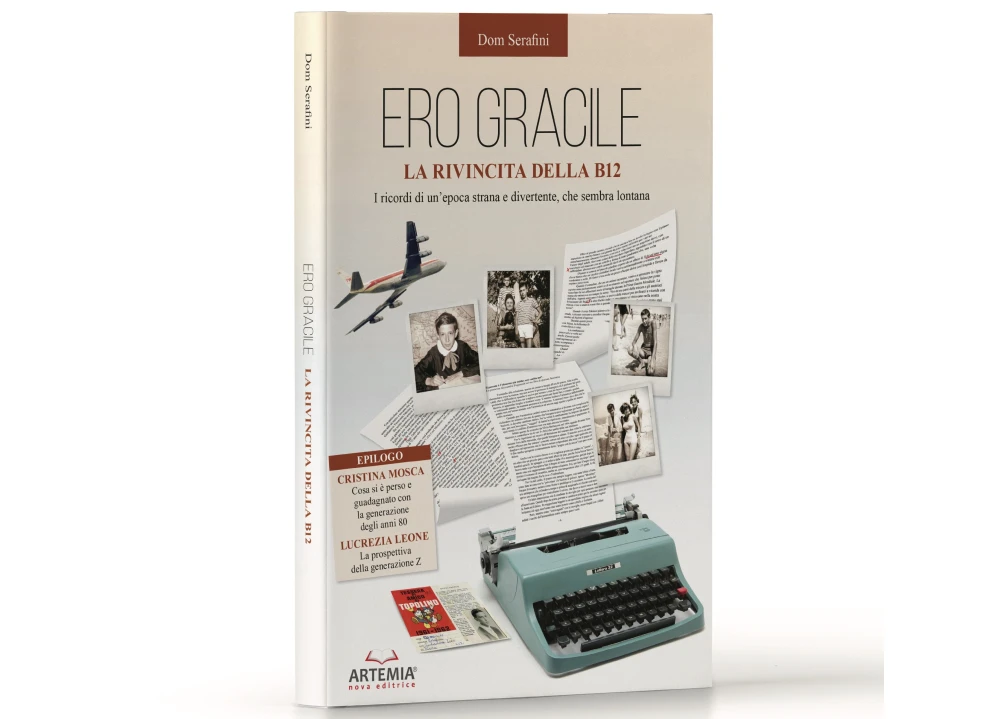"Ero Gracile: La Rivincita Della B12," an article about growing up in Italy in the 1960s was originally published in Oggi7, the Sunday insert of the U.S.-based Italian-language daily newspaper AmericaOggi, on July 8, 2018. After a seven-month gestation, it was developed into a book at the urging of some of the newspaper's readers, who posted on the author's Facebook page their collective wish to read more similar stories.
And so the book, I Was Frail: The Revenge of the B12 Vitamin & Memories of a Peculiar and Funny Era That Seems Long Gone, was born. It was written by Dom Serafini, editor of the New York City-based VideoAge, and a regular contributor to AmericaOggi. The book was published by Artemia Nova Editrice of Mosciano (Teramo) in Italy and is available on Amazon.com outside Italy.
The book tackles topics of daily life in Italy in the 1960s, particularly in the author's native Abruzzo Region. Some of those topics (such as little consumer waste and no recycling) have long since been lost, while others are still current (such as the mass migration of young Italian professionals to the U.S.). Serafini also covered what has been lost and/or earned over the years. Furthermore, the book links the Abruzzo Region with Milan and America.
The book itself is pleasant to read and makes use of humorous aphorisms that keep the narrative from becoming less entertaining.
The synopsis of the book reads as follows: "This book is addressed to three generations: to the one that came of age during the 60s, to their children, and to their grandchildren.
Readers who came of age during the 60s will look back nostalgically upon a period that time has turned what was then perceived as dramas into what now are viewed as comedies. Those who grew up in the 80s will be able to understand why their parents are so "strange." And the latest generation will discover that their grandparents were completely lacking in any and all obesity-related problems.
The 60s were known to many as a period in which an "Italian economic miracle" occurred, but those who lived through it failed to notice it then — they were only told about it later.
The leitmotif of the book is how to solve the existential problems caused by the youthful frailty of the author. Then there are the sub-themes, like his obsession with going to America (now a desire renewed in many young Italian people); the review of a daily way of life that is almost forgotten; the recollection of an old-fashioned school system that still worked despite its shattered form; and of course the importance of the home kitchen as a family fulcrum, before the gathering place moved to the living room.
It was essentially a simple era, when the Americans and the Russians got into fights without getting hurt, and the antagonism was moved into space with the race to land men on the moon.
It was such a simple period, in fact, that it is hard to remember today how people lived without having to recycle everything, without dedicated bicycle paths, and without supermarkets in airports.
Who the author is explained on the book's back cover: "Dom(enico) Serafini has written eight books, two of which were digital, but they're all boring except one: this one! His boring books have almost all to do with television, including, The TV via Internet, published in 1999. This latest book, however, is autobiographical, entertaining and describes how time transformed dramas into comedies.
Serafini has contributed to various newspapers and magazines, including Il Sole 24 Ore, Il Corriere della Sera, and Corriere Adriatico. Today, he writes for AmericaOggi, Affari Italiani, and he has a Sunday column in Il Messaggero, about people from Abruzzo living outside Italy.
Serafini was also a three-time candidate for the Italian Parliament with the vote of Italian citizens living outside Italy (once with a party that he founded), but the voters did not find him as amusing as the other candidate from Abruzzo and elected abroad, former senator Antonio Razzi.
For a living, he works as the editor of the New York-based VideoAge, a monthly TV magazine he founded in 1981 that, without his awareness, has become the leading Hollywood publication for the buying and selling of television programs. Overcoming many difficulties in 1983, Serafini also founded VideoAge Daily, a trade fair printed daily. The hardship made him realize why no one was able to do it before. In 1983, he also changed the name of Hollywood’s main trade TV event from the "May Screenings" to the "L.A. Screenings," which is universally accepted today.
To relax, Serafini would like to tend crops, but the lack of sun in his New York City apartment only allows him to work in a small garden. And instead of growing tomatoes, he nurtures green plants, ferns in particular.
Among the many awards he has received, there is a summons for slander from the Milan Malpensa airport for having complained that the site lacked sufficient electrical outlets to recharge laptops and cell phones.



